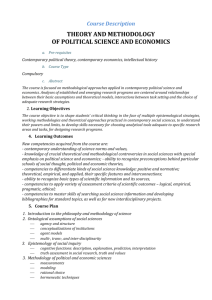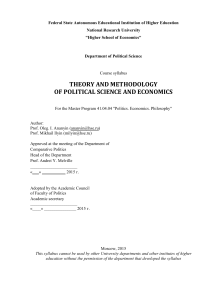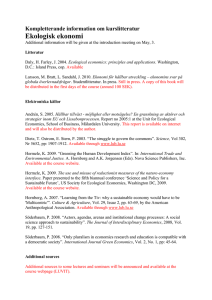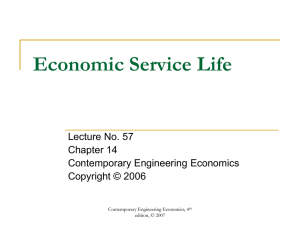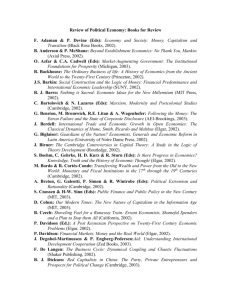Programme
advertisement
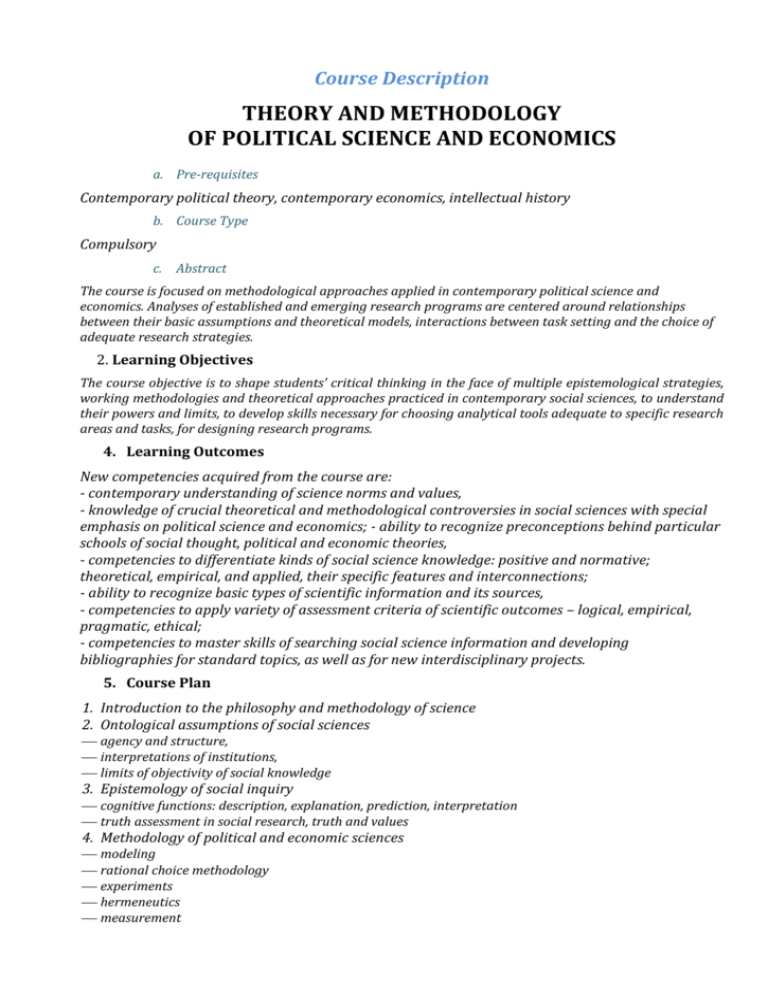
Course Description THEORY AND METHODOLOGY OF POLITICAL SCIENCE AND ECONOMICS a. Pre-requisites Contemporary political theory, contemporary economics, intellectual history b. Course Type Compulsory c. Abstract The course is focused on methodological approaches applied in contemporary political science and economics. Analyses of established and emerging research programs are centered around relationships between their basic assumptions and theoretical models, interactions between task setting and the choice of adequate research strategies. 2. Learning Objectives The course objective is to shape students’ critical thinking in the face of multiple epistemological strategies, working methodologies and theoretical approaches practiced in contemporary social sciences, to understand their powers and limits, to develop skills necessary for choosing analytical tools adequate to specific research areas and tasks, for designing research programs. 4. Learning Outcomes New competencies acquired from the course are: - contemporary understanding of science norms and values, - knowledge of crucial theoretical and methodological controversies in social sciences with special emphasis on political science and economics; - ability to recognize preconceptions behind particular schools of social thought, political and economic theories, - competencies to differentiate kinds of social science knowledge: positive and normative; theoretical, empirical, and applied, their specific features and interconnections; - ability to recognize basic types of scientific information and its sources, - competencies to apply variety of assessment criteria of scientific outcomes – logical, empirical, pragmatic, ethical; - competencies to master skills of searching social science information and developing bibliographies for standard topics, as well as for new interdisciplinary projects. 5. Course Plan 1. Introduction to the philosophy and methodology of science 2. Ontological assumptions of social sciences agency and structure, interpretations of institutions, limits of objectivity of social knowledge 3. Epistemology of social inquiry cognitive functions: description, explanation, prediction, interpretation truth assessment in social research, truth and values 4. Methodology of political and economic sciences modeling rational choice methodology experiments hermeneutics measurement project methodologies interdisciplinary research 6. Reading List a. Required 1. Hausman, D. , ed. Philosophy of economics. An Anthology. 3d ed. Cambridge University Press. 2007 2. The Oxford Handbook of Contextual Political Analysis / Ed. by R.E. Goodin and Ch. Tilly. Oxford University Press, 2008. 3. The Oxford Handbook of Political Methodology. Ed. by J.M. Box-Steffensmeier e.a. Oxford University Press, 2008. 4. Mäki, U., ed. The Economic World View. Studies in the Ontology of Economics. Cambridge University Press. 2001. 5. Reiss, J. Philosophy of Economics. Contemporary Introduction. Routledge. 2013. 6. Risjord, M. Philosophy of Social Science. A Contemporary Introduction. Routledge. 2014. 7. The New Palgrave. Dictionary of Economics (selected items). 8. Giddens, A. “New rules of sociological method” 9. Agassi, J. Institutional individualism. The British Journal of Sociology, vol. XXVI (2), 1975, 144-155. 10. Hudik, M. Why economics is not a science of behavior. Journal of Economic Methodology, vol. 18 (2), 2011, 147-162. 11. Popper, K. The logic of social sciences . The Positivist Dispute in German Sociology. London: Heinemann, 1976. Pp. 87-104 12. Coase, R. The nature of the firm // Economica, New Series, Vol. 4, No. 16. (1937), pp. 386-405. 13. Searle, J. What is an institution? Journal of the Institutional Economics, vol. 1 (1), 2005, 1-22 14. Sen, A. Description as choice . Oxford Economic Papers, New Series, Vol. 32, No. 3 (1980), pp. 353-369 15. Samuels, W. «Truth» and «discourse» in the social construction of reality . Journal of Post Keynesian Economics. 1991. Vol. 13, N 4, pp. 511-524. 16. Colander D. From muddling through to the economics of control. Middlebury College Economics Discussion Paper No 04-21 b. Optional 1. Mäki, U. (Ed.) Philosophy of Economics. Series: Handbook of the Philosophy of Science, Vol. 13. Amsterdam etc: Elsevier. 2012. 2. Tilly Ch. Big Structures, Large Processes, Huge Comparisons. Russell Sage, 1984. 3. Wittek, R., Snijders, and V. Nee, eds. The Handbook of Rational Choice Social Research. Stanford University Press. 2013. 4. The Oxford handbook of philosophy of social science. Ed. by H. Kincaid. Oxford University Press, 2012. 5. Maas, H. Economic Methodology. A Historical Introduction. Routledge. 2014 6. Henning, T. and David P. Schweikard, ed. Knowledge, Virtue, and Action: Putting Epistemic Virtues to Work. Routledge: 2013. 7. Katznelson, I., & Milner, H., eds. Political Science: The State of the Discipline. NY: Norton, 2002 8. Langenhove, L. van, ed. People and Societies. Rom Harré and Designing the Social Sciences. Routledge. 2010. 9. Hausman, D. The Inexact Separate Science of Economics. Cambridge University Press. 1992. Appendix: An introduction to philosophy of science 10. Blaug, M. The Methodology of Economics. 2nd ed. Cambridge University Press. 1992. 11. Hands, D. Wade. Reflection without Rules. Economic Methodology and Contemporary Science Theory. Cambridge University Press. 2001 12. Benton, T. and I. Craib. Philosophy of Social Science. The Philosophical Foundations of Social Thought. Palgrave-Macmillan: 2011. 13. Bishop, R.C. The Philosophy of the Social Sciences. L. & NY: Continuum.2007. 14. Boumans, M., Davis, J.B. Economic Methodology. Understanding Economics as a science. PalgraveMacmillan, 2010. 15. Boumans M., ed. Measurement in economics: a handbook. Academic Press. 2007 16. Davis, J., et al.,eds. Elgar Companion to Economics and Philosophy. Cheltenham: Edward Elgar. 2004 17. Davies, J., Hands, W., eds. The Elgar Companion to Recent Economic Methodology. Cheltenham: Edward Elgar. 2011. 18. della Porta D., Keating M. (eds.) Approaches and Methodologies in the Social Sciences. Cambridge University Press, 2010. 19. Bourdieu, P. Social Space and Symbolic Space (From: Pierre Bourdieu, Practical Reason). 20. The End of Value-Free Economics. Ed. by Hilary Putnam and Vivian Walsh. L. & NY: Routledge. 2012. 21. Rubinstein, A. Dilemmas of economic theorist / Econometrica, Vol.74 (July 2006), N 4, pp. 865–883 7. Grading System The final grade will consist of: - two prepared works (an essay and a class presentation): 10% for each - participation in the class: 30% - final exam: 50% 8. Guidelines for Knowledge Assessment Students are expected to study recommended literature before respective lectures, seminars and class exercises. Participation in class discussion and exercises, including team work is required. Class presentations should be prepared in PowerPoint. 9. Methods of Instruction Students are encouraged to interact with colleagues and teachers, propose topics of their papers.

